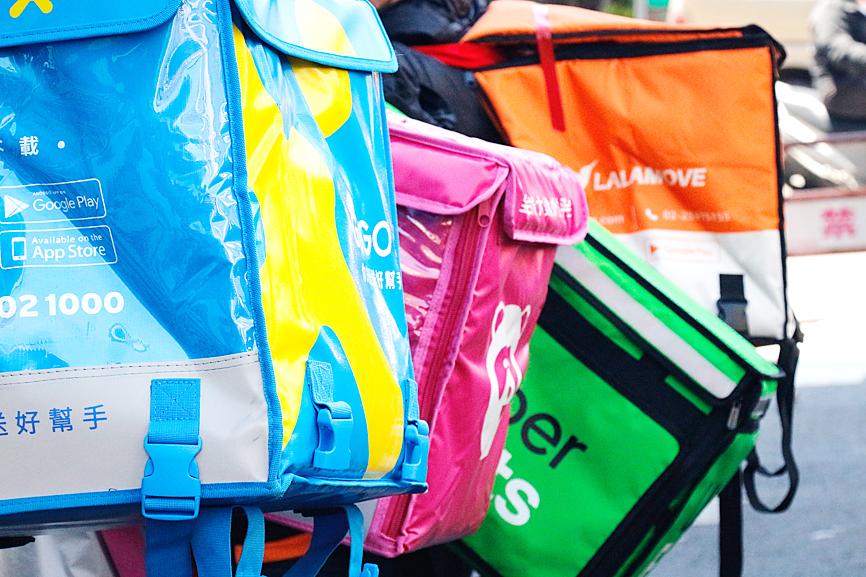People working with Taiwan’s major food delivery platforms on Tuesday pledged to form a union to demand fair pay and called for legislative action.
At a news conference outside the Ministry of Labor building in Taipei, organizers called on people who work with Foodpanda Taiwan Co (富胖達) and Uber Eats Taiwan to sign up for the proposed National Delivery Industrial Union.
The main purpose of the union is to increase delivery drivers’ leverage in negotiating for fair pay rules with the two platforms, said Su Po-hao (蘇柏豪), the group’s spokesman.

Photo: CNA
Last month, Foodpanda introduced new pay rules, citing better compensation for drivers who dispatch orders with pickups far from their destinations the main reason, said Chen Yu-an (陳昱安), another group member.
A few weeks later, Uber Eats did the same, saying that the new rules would encourage drivers to take orders during peak times, Chen said.
However, service fees were reduced, Su said.
Drivers for Foodpanda in Taichung, as well as Changhua and Nantou counties, faced a pay decrease of 10 to 30 percent last month, while Uber Eats deliverers in Taipei, New Taipei City and Keelung saw similar drops, he said.
Drivers usually have no idea how the platforms gauge their service fees, Chen said.
After updating the rules this month, Uber Eats no longer reveals the makeup of a driver’s service fee for each order, he said.
The union would also seek to lobby the ministry and lawmakers to propose legislation for food deliveries and protect drivers’ rights, they said.
The number of food deliverers in Taiwan had increased to 88,000 as of the end of last year, ministry data showed.

MULTIFACETED: A task force has analyzed possible scenarios and created responses to assist domestic industries in dealing with US tariffs, the economics minister said The Executive Yuan is tomorrow to announce countermeasures to US President Donald Trump’s planned reciprocal tariffs, although the details of the plan would not be made public until Monday next week, Minister of Economic Affairs J.W. Kuo (郭智輝) said yesterday. The Cabinet established an economic and trade task force in November last year to deal with US trade and tariff related issues, Kuo told reporters outside the legislature in Taipei. The task force has been analyzing and evaluating all kinds of scenarios to identify suitable responses and determine how best to assist domestic industries in managing the effects of Trump’s tariffs, he

TIGHT-LIPPED: UMC said it had no merger plans at the moment, after Nikkei Asia reported that the firm and GlobalFoundries were considering restarting merger talks United Microelectronics Corp (UMC, 聯電), the world’s No. 4 contract chipmaker, yesterday launched a new US$5 billion 12-inch chip factory in Singapore as part of its latest effort to diversify its manufacturing footprint amid growing geopolitical risks. The new factory, adjacent to UMC’s existing Singapore fab in the Pasir Res Wafer Fab Park, is scheduled to enter volume production next year, utilizing mature 22-nanometer and 28-nanometer process technologies, UMC said in a statement. The company plans to invest US$5 billion during the first phase of the new fab, which would have an installed capacity of 30,000 12-inch wafers per month, it said. The

Taiwan’s official purchasing managers’ index (PMI) last month rose 0.2 percentage points to 54.2, in a second consecutive month of expansion, thanks to front-loading demand intended to avoid potential US tariff hikes, the Chung-Hua Institution for Economic Research (CIER, 中華經濟研究院) said yesterday. While short-term demand appeared robust, uncertainties rose due to US President Donald Trump’s unpredictable trade policy, CIER president Lien Hsien-ming (連賢明) told a news conference in Taipei. Taiwan’s economy this year would be characterized by high-level fluctuations and the volatility would be wilder than most expect, Lien said Demand for electronics, particularly semiconductors, continues to benefit from US technology giants’ effort

‘SWASTICAR’: Tesla CEO Elon Musk’s close association with Donald Trump has prompted opponents to brand him a ‘Nazi’ and resulted in a dramatic drop in sales Demonstrators descended on Tesla Inc dealerships across the US, and in Europe and Canada on Saturday to protest company chief Elon Musk, who has amassed extraordinary power as a top adviser to US President Donald Trump. Waving signs with messages such as “Musk is stealing our money” and “Reclaim our country,” the protests largely took place peacefully following fiery episodes of vandalism on Tesla vehicles, dealerships and other facilities in recent weeks that US officials have denounced as terrorism. Hundreds rallied on Saturday outside the Tesla dealership in Manhattan. Some blasted Musk, the world’s richest man, while others demanded the shuttering of his